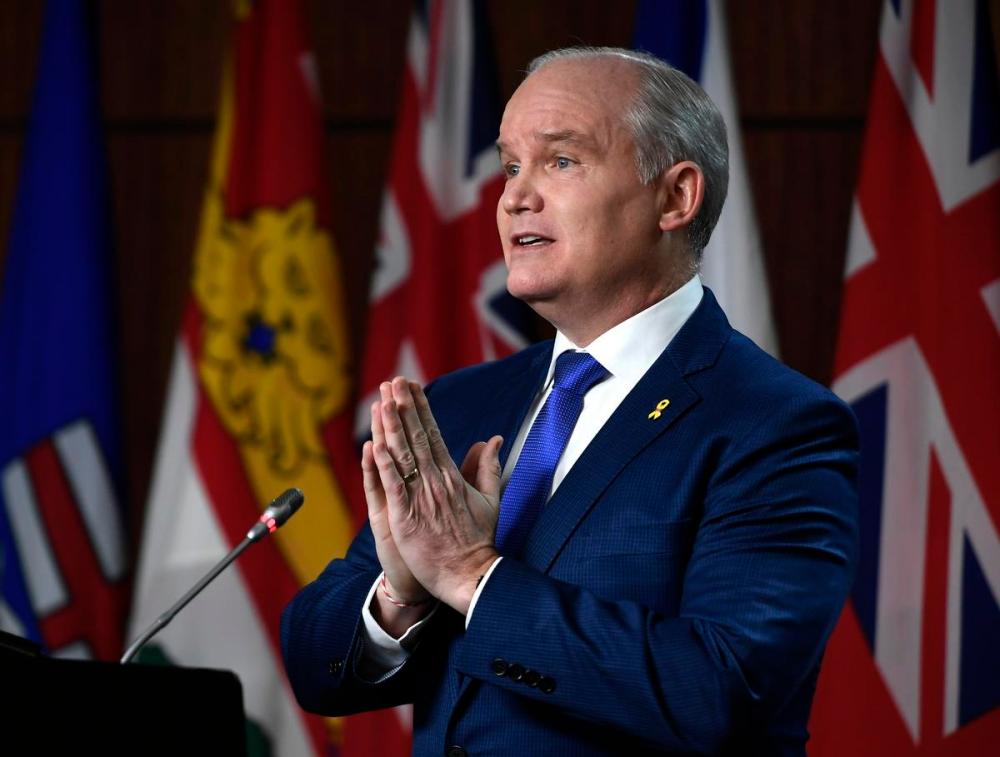If Erin O’Toole’s critics win, they’ll consign Conservatives to political oblivion
Advertisement
Read this article for free:
or
Already have an account? Log in here »
To continue reading, please subscribe:
Monthly Digital Subscription
$0 for the first 4 weeks*
- Enjoy unlimited reading on winnipegfreepress.com
- Read the E-Edition, our digital replica newspaper
- Access News Break, our award-winning app
- Play interactive puzzles
*No charge for 4 weeks then price increases to the regular rate of $19.00 plus GST every four weeks. Offer available to new and qualified returning subscribers only. Cancel any time.
Monthly Digital Subscription
$4.75/week*
- Enjoy unlimited reading on winnipegfreepress.com
- Read the E-Edition, our digital replica newspaper
- Access News Break, our award-winning app
- Play interactive puzzles
*Billed as $19 plus GST every four weeks. Cancel any time.
To continue reading, please subscribe:
Add Free Press access to your Brandon Sun subscription for only an additional
$1 for the first 4 weeks*
*Your next subscription payment will increase by $1.00 and you will be charged $16.99 plus GST for four weeks. After four weeks, your payment will increase to $23.99 plus GST every four weeks.
Read unlimited articles for free today:
or
Already have an account? Log in here »
Hey there, time traveller!
This article was published 01/02/2022 (1402 days ago), so information in it may no longer be current.
For many long years, the federal Conservatives have been two factions warring in the bosom of a single party.
That alone means it’s not entirely a bad thing for leader Erin O’Toole to have a caucus revolt brought into the open and for the party’s MPs to have to decide what they want to be.
For O’Toole personally, a clean execution is probably preferable to a slow death by a thousand treacheries.

To his credit, he welcomed the challenge to his leadership by about a third of his MPs. And he aptly laid out the stark choice they face.
“There are two roads open to the party,” O’Toole said. “(One) is angry, negative and extreme. It is a dead end.”
The other, he went on, is “to recognize that conservatism is organic, not static, and that a winning message is one of inclusion, optimism, ideas, and hope.”
That’s the path to a more modern middle that O’Toole has followed, if erratically, since he succeeded Andrew Scheer as leader.
The Conservative rift has longstanding fault lines. In the 1980s, former prime minister Brian Mulroney married western conservatives, Ontario moderates and Quebec nationalists in a Progressive Conservative coalition that delivered two sweeping majorities.
But that union didn’t hold.
Western discontent gave rise to the Reform party; in Quebec there rose the Bloc Québécois. Then came the Canadian Alliance, which swallowed the remnant PCs to become the more right-wing Conservative Party of Canada.
For a time, power allowed former PM Stephen Harper to paper over the cracks. Loss of it exposed Scheer and O’Toole to the challenge of trying to reconcile disparate wings of the party without the carrots and sticks of office.
It’s no coincidence that the Conservative festering erupted in tandem with the egregious display by protesters jamming the streets of Ottawa this week.
The standoff in the streets is the Conservative identity crisis made manifest.
The challenge to O’Toole’s leadership has been coming since the disappointing results of last year’s federal election that saw re-election of a Liberal minority, and since he had the party back a bill banning conversion therapy.
It all adds up to a very good week for Prime Minister Justin Trudeau and the Liberals.
Both the appalling antics of the demonstrators and the internal Conservative ruckus makes Trudeau look strong, settled and serene by comparison.
For their part, both O’Toole and the Conservative rebels face unpalatable options.
The party can either moderate and follow O’Toole’s move to the centre or consign itself to a long stint on the margins as champions of a constituency that isn’t big enough ever to form government.
If O’Toole’s critics do manage to yank the party back in line with its conservative base, it would be a classic Pyrrhic victory. It would deny the basic reality of where Canadian elections are won. It’s the road to oblivion.
For O’Toole, his continued leadership is already probably untenable.
If he loses the caucus challenge, he’s out as leader. But even if he fights it off, the implacable wing of his party demanding his ouster is not going away. The internecine intrigue will continue.
It’s axiomatic in politics that the greatest danger to a leader comes as often from his or her supposed friends as from foes. To his considerable dismay, Erin O’Toole is discovering the truth of that.
Meanwhile, the prime minister and the Liberals can look on with no small satisfaction.



